N4 Scottish Music
Instruments of Scotland
Bagpipes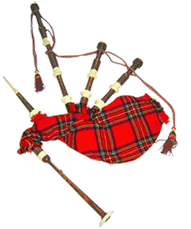
|
Fiddle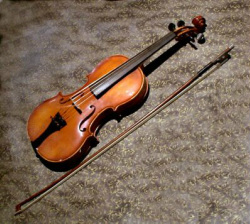
Another name for the violin, used in Scottish folk music.
Lots of fiddles play together in a fiddle orchestra. Listen to a fiddle here |
Accordion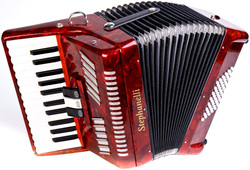
|
Acoustic Guitar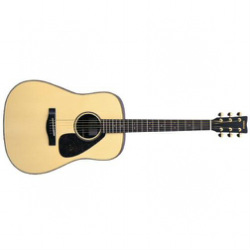
The acoustic guitar is a stringed instrument that is played by plucking or strumming the strings with fingers, or using a plectrum. It has six strings and the hollow body amplifies the sound of the vibrating strings. An acoustic guitar does not need electricity to produce the sound.
Listen to an acoustic guitar here and here |
|
|
Eddi Reader and her band performing "Charlie is my Darling" |
Bands of Scotland
Folk Group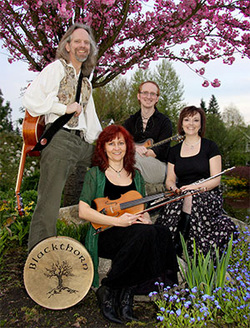
A group of singers and instrumentalists who perform traditional music from a particular country, eg Scotland and Ireland. Scottish folk music instruments might include fiddle, whistle, guitar, accordion and pipes Have a listen to a Folk Group here |
Scottish Country Dance Band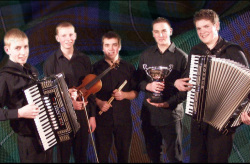
A band which plays Scottish music for people to dance to. The instruments may include fiddle, accordion, piano and drums. Sometimes called a Ceilidh Band Have a listen to a Scottish Country Dance Band here |
Pipe Band
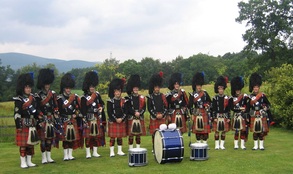
A band made up of bagpipes and drums.
Three different types of drums are used - Snare drum, Tenor Drum and Bass Drum
Have a listen to a pipe band here
Three different types of drums are used - Snare drum, Tenor Drum and Bass Drum
Have a listen to a pipe band here
|
Three Scottish guys playing the Hokey Cokey for wedding guests! |
|
Dances of Scotland
Waltz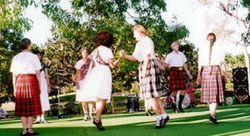
A dance with three beats in a bar in simple time
Most waltzes will have a slower tempo than some of the other dances. Listen to this example of a Waltz |
March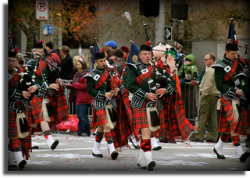
Music with a strong steady pulse, with two or four beats in a bar, and at a speed that is suitable to march to.
usually played by pipe bands (a band of bagpipes and drums) but also by solo instruments, military bands, Scottish dance bands, fiddle orchestras and modern-style Scottish folk and folk rock groups. Listen to this example of a March |
Strathspey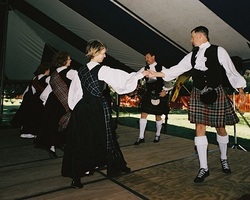
A Scottish dance with four beats in a bar, with dotted rhythms, and usually featuring the Scotch snap.
It can sound stately and elegant. Listen to this example of a Strathspey |
Jig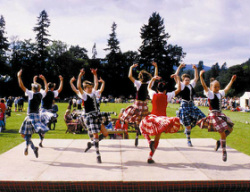
A fast dance in compound time. Usually 2 beats in a bar, with each beat dividing into 3 quavers.
(you'll be able to sing "Jig-i-ty jig-i-ty jig-i-ty jig-i-ty" along with the music!) Listen to this example of a Jig. |
Reel
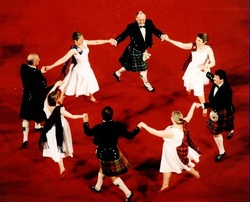
A Scottish dance written in simple time with two or four beats in a bar. It is usually in a major key and is played at a fairly fast tempo. Each beat can be heard dividing equally into groups of two or four.
Listen to this example of a Reel
Listen to this example of a Reel
Simple time
The music has two, three or four beats in each bar, and each beat is a crotchet (1 beat note) and each beat can be divided into 2. If you try saying the word 'sim-ple' in each beat, and it fits with the notes, then you are listening to simple time
Simple time signatures are written as 2/4, 3/4 and 4/4 |
Compound time
The beat is divided into groups of three – if you say 'lollipop' as you listen to compound time music, the three syllables fit within each beat. Compound time signatures are written as 6/8, 9/8 and 12/8 |
Vocal Music
Mouth Music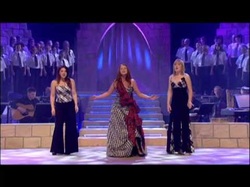
Unaccompanied songs with Gaelic or nonsense words, normally sung for ceilidh dances.
the nonsense words are supposed to imitate instruments as the style dates far back in Scottish history when Highlanders were stripped of any and all instruments. Mouth music sometimes has a beat played on a bodhran. Listen to this example of Mouth Music |
Scots Ballad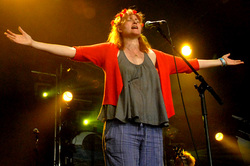
A Scottish song which tells a story.
It is in strophic form, which means that the same music is repeated for each verse. Examples of Scots ballads are 'Flower of Scotland' and 'Loch Lomond'. Listen to this example of a Scots Ballad |
Compositional Techniques
Pentatonic
Any five-note scale. In practice, the most common one is that on which much folk music is based, particularly Scottish and Celtic.
The five notes could be C D E G A. |
Scotch Snap
|
Vamp
A rhythmic accompaniment with a bass note played on the beat and a chord off the beat.
Usually played on piano, guitar or accordion ( in Scottish music) |
|
|
Bobby McFerrin demonstrates the Power of the Pentatonic Scale
Scottish Test
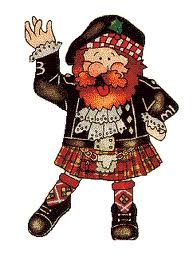
Now you have learned all the National 4 Scottish concepts - do the online test to see how well you have learned them! Click on Hamish McLintock to go to the test.


